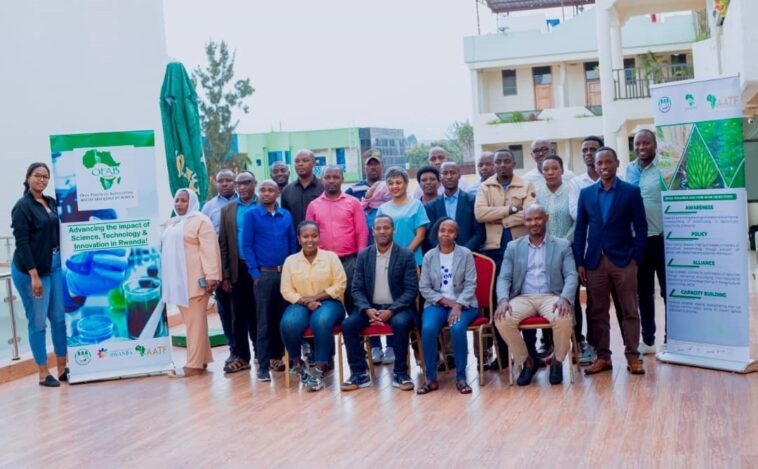February 16, 2024 – The Open Forum on Agricultural Biotechnology (OFAB) in collaboration with the African Agricultural Technology Foundation (AATF) and other stakeholders completed a 5-day workshop on the Capacity Development and Engagement of Media for Biotech Advocacy in Rwanda.
The workshop’s main purpose was to improve science communication across agriculture reporting media and knowledge sharing, and even knowing the benefits of using technology in agriculture, especially the so-called modern biotechnology.
Pacific NSHIMIYIMANA, an agricultural scientist at Alliance for Science Rwanda, focused on the reasons why they organize training sessions for journalists, as well as what benefits Rwandan society in general.
He revealed Rwanda utilizes biotechnology to increase agricultural productivity and resilience, with a focus on genetically modified crops and biotechnology research to address issues such as pests, diseases, and climate change.
He said, “If you look at science, it’s something we need in our daily lives, we are all OFAB chapter partners, we invite all people working in the media to this training but we also invite others including the youth in agriculture, women, the private sector, and those in administrative positions.”
“We organize training for everyone who can help in spreading the benefits of using modern biotechnology in agriculture, which is a technology that is used to produce seasonal seeds, disease-resistant seeds, and seeds that can help farmers increase production but protect the environment so that we can get a good harvest in the market so that it can’t keep being cheap but productive for everyone, It is in this context that RAB has research that is going on to work on biotechnology to deliver good seeds to the people.”
Pacific said that the workshop’s purpose is to empower journalists to write or disseminate good information, with in-depth research that talks about all sides so that everyone, the farmer, or the consumer of food in the market, can be sure that the production meets the requirements.
“The aim is that at the end of the training, journalists will have sufficient knowledge and sources they can quote when publishing information related to science on agriculture,” he said.
He continued that GMO products on the market are the result of research, trials, and verification, and they have been used in some countries, including the United States, for many years.
He said GMO foods are safe to consume because to get their crops, they go through several stages: It begins with identifying a problem and a research idea, then progresses to laboratory tests, confined trials, environmental release, commercial release of the product, and seed multiplication.

During his speech, Emmanuel Mugisha, Executive Secretary of Rwanda Media Commission (RMC), highlighted the impact of Agriculture Biotechnology on food security in Rwanda and encouraged journalists to uphold ethical journalism standards while working professionally.
He said that Rwanda still has problems with food security despite its progress, because of its small amount of arable land, dense population, and vulnerable climate. Ensuring food supply is a national priority, with a focus on food security, and biotechnology plays a critical role in the development of high-yield crop varieties to address the challenge.
He continued emphasizing the importance of journalists providing accurate information about biotechnology in shaping public understanding and acceptance. It helps to dispel myths and misinformation, giving the public reliable information to make informed decisions about biotech products.
He said, “There is an increasing trend in media coverage that focuses on the benefits and risks of agricultural biotechnology. Coverage will include more nuanced discussions about the ethical, environmental, and economic implications of biotech advancements.”
During the workshop, the last two years of OFAB Media award winners which have been hosted by AATF and engaged with ag-biotech communicators at the continental level, shared their experiences, challenges, and successes, serving as role models for both new and existing journalists aiming to report positive stories on biotechnology.

Christophe UWIZEYIMANA, the 2023 OFAB Media award winner, shared the importance of this training and his experience that helped him to become a champion.
He said, “Before I understood agriculture biotechnology and confused it with mechanized agriculture, like any other journalists who have not been able to participate in this training, but now it’s different, the more I continued to participate in OFAB’s various activities, the more I became interested in agriculture biotechnology.”
He noted that to win the award, he had various discussions with scientists, policymakers, and the public, purposing to bridge the gap between scientific research and societal needs.








